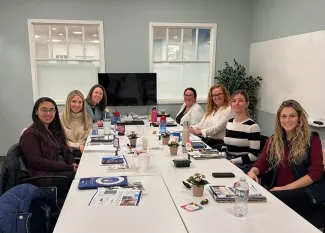
Business Tips from SCORE: How 'kaizen' can lead to small business success on Cape Cod
Contributed by Marc L. Goldberg, Columnist
The Japanese word “kaizen” means change for the better with an emphasis on continuous improvement. Who could not want that? If you have a satisfied customer today, would you not want an even more satisfied customer tomorrow who will buy more and tell more people to frequent your business and buy?
The improvement doesn’t have to be large. It can be a tiny step, but one that makes a difference. In recent history, the concept was adopted and improved by Toyota. In Japan, kaizen typically refers to small steps in improvement, but in the U.S. the concept has been adopted to mean driven by continuous improvement.
Kaizen is a daily process and therefore is beyond a simple process of productivity improvement. When undertaken appropriately it teaches people to perform experiments on their work to spot and eliminate waste.
As a concept, it humanizes work by adopting policies and procedures that nurture workers through praise and encouragement and active engagement in all the activities of the enterprise. This process is not left to just the “workers” but includes all levels of the organization from the ownership through to the lowest-level member of the team.
The format for kaizen can be individual, a suggestion system, or a small or large group. It can also be cross-functional within an organization.
What has been found in larger organizations that have adopted the concept is small improvements and standardized results in terms of productivity improvements. Overall the biggest difference is that compared to “command and control” management philosophies it focuses on organizational inclusiveness.
There are five fundamentals of kaizen. Know your customer (also a teaching of Sun Tsu), Let it Flow, Empower People and be transparent. The fundamentals are supported by three pillars: Housekeeping, Elimination of Waste and Standardization.
Know your customer. One of the first elements of the Business Model Canvas (www.strategyzer.com) after defining your value proposition is identifying your customer segments. Who is your customer? What defines them? What are their needs, wants and desires (that you can satisfy)? Where are they and how you can reach them are all part of the process of knowing your customer. Know what they buy, why they buy it and what differentiators are important to them. These questions are part of kaizen since all improvements in organizational performance a centered around the customer.
DevelopGoodHabits.com recommends the following that can be applied to small businesses:
Be proactive. Don’t wait for something negative to happen. Plan in advance how you can become more efficient and productive, then act. But, don’t stop. Keep the momentum moving you forward.
Practice the five W’s, but focus first and foremost on "Why". Understanding why a process is done the way it is currently done will help you envision what it might be to become more productive. Empower the team to speak up and make decisions on their own that will improve working conditions. Identifying issues, taking ownership and taking corrective actions quickly keeps the wolf away from the door and provides a sense of ownership when actions are taken quickly to correct issues.
Evaluate all processes and procedures. Cast out the old ones that are no longer productive and replace them with new ones created by the worker teams.
A "yes culture": Once your concepts are ingrained in the workforce, then foster a "yes culture" where everyone approaches their work with a win-win attitude and team members are empowered to make the small changes each day that culminate in bigger changes.
Part of the organizational culture needs to be “continuous improvement”. That is the only way changes occur positively. Change can be dictated, however in order for it to take root and permeate throughout the organizations it needs to be integral to the culture when anyone is undertaking any of their work assignments, they ask, “how can this process be improved”?
Michaela Herlihy, owner of Beacon Financial Planning in Hyannis, said the company employs the kaizen concept by holding annual strategic business planning meetings with all team members involved. During this meeting, they celebrate their previous wins and look for places where they can improve and add value to their client’s lives.
“Beacon has a culture of coaching and celebrating the wins along the way, but also supporting each other and making room for each of us to be human,” Herlihy said. Each team member has access to a life coach, Laurie McAnaugh, for 1.5 confidential hours each month to work on anything they need, whether personal or professional.
Beth Marcus, co-owner of Cape Cod Beer in Hyannis, said one way they strive for constant improvement in their retail operation at the brewery is that they do a weekly look back and review, every week before they begin talking about the week ahead.
This means at their weekly retail events and marketing meeting they talk about every day since the team last met, dissecting the events of each day and talking about “the good, bad and ugly” and how we might have improved the outcome whether, through efficiency and/or planning, Marcus said.
She said the goal is to improve the customer (or staff) experience and maximize the possible outcomes.
At first, some newer staff people feel like the conversation is “being critical” or “picking on them” but eventually everyone learns that it’s part of the process of constant improvement, and often that results in making their jobs easier. "We feel strongly that learning from our mistakes, and our successes, is an important part of our daily lives," Marcus said.
Kaizen might be Japanese in its origin, however, it has a place in U.S. small-business culture if they are going to be a positive force when competing against their larger competitors. To overcome many of the multi-level issues facing small business owners today, there needs to be a reckoning with complacency.
Contributed by Marc L. Goldberg, Certified Mentor, SCORE Cape Cod & the Islands. www.capecod.score.org, 508-775-4884, capecodscore@scorevolunteer.org.
Sources: A Small Business Owner’s Guide to Kaizen, Eric Rosenberg, 1/27/2021. 10 Principles of Kaizen, Developgoodhabits.com.
https://www.capecodtimes.com/story/business/columns/2023/01/29/how-kaizen-continuous-small-improvements-leads-to-business-success/69830476007/

